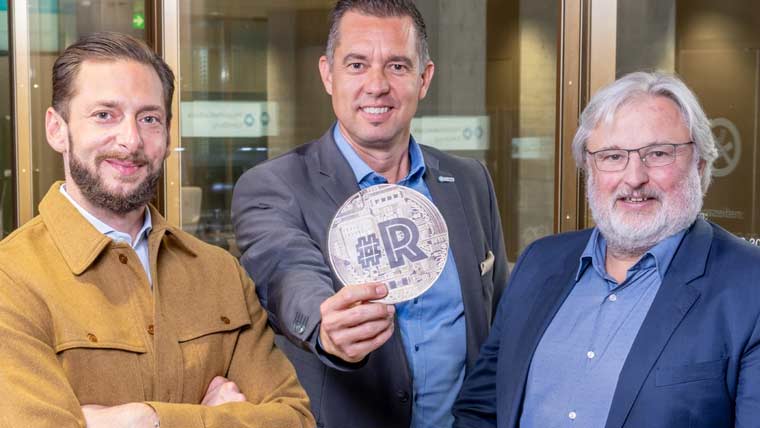Nicola Pain, CEO of Aktionariat AG, Dani Stüssi, CEO of RealUnit Schweiz AG, and Reto Huenerwadel, Head of Market Services at Hypothekarbank Lenzburg AG, are launching a solution for the custody of RealUnit share tokens at HBL. (Image: Beni Basler/Hypothekarbank Lenzburg AG)
Premiere: Hypothekarbank Lenzburg creates custody solution for RealUnit share token
First published on BTC-ECHO – Guest article by Pascal Hügli*, long-time financial journalist, freelance moderator, debater, ghostwriter and lecturer at the HWZ.
Tokenized assets – or Real World Assets, also known as RWAs – are currently on everyone’s radar again. The Swiss equity token “RealUnit” is right in the middle of it all. As a digital bearer instrument, it can be held independently on the blockchain or officially deposited with a Swiss bank – a global first.
Blockchains will turn the financial world upside down. They offer a new foundation on which transactions, agreements and thus business can be implemented more transparently and efficiently. Although central counterparties will not disappear, their activities will be more strongly regulated by mathematics in the foreseeable future and enforced with the code on the blockchain.
The Swiss Hypothekarbank Lenzburg shares this view. As a consequence, the bank has expanded its organizational structure and its core banking system Finstar so that it is now in a position to offer services for digital assets. As its first flagship project, the bank is launching a custody offering for digital share tokens and has already integrated an initial use case with the RealUnit Schweiz AG share token. This allows the share token to be deposited directly with the Swiss bank. This means that the world of traditional finance (TradFi) and that of blockchain-based financial protocols are growing ever closer.
Recently, so-called “DeFi” projects – due to their often insufficient decentralization, it would be more accurate to call them “on-chain finance” – have shown the way for future innovation in the financial sector. However, despite innovative technology and the emergence of new use cases, blockchain-based financial protocols remained a speculative niche that created little sustainable value for users.
Tokenized real assets are on the rise
The emerging ecosystem of real-world assets – RWAs for short, or tokenized real assets – has brought hope for change. The tokenization of real assets on the blockchain represents a great opportunity to bring “digital asset” investors the sustainable added value that the first wave of DeFi was unable to deliver.
The figures show just how hot the RWA topic is in a crypto market that is still very subdued: Since the beginning of the year, the value that has flowed into the RWA sector(TVL is the total value that protocols account for) has risen by around 795%, from 118 million to just over one billion US dollars. The number of RWA token holders on the Ethereum blockchain has also been growing strongly for months. While there were just under 8,000 wallets holding an RWA token just under two years ago, this figure has now risen to over 42,000.
RWAs can come in many forms. The first ideas for tokenizing precious metals, real estate and luxury goods began circulating years ago. However, tokenized bonds, or more precisely tokenized government bonds such as US Treasuries, have made the most progress. These tokens are tokenized US government bonds issued by protocols such as Ondo, Maple, Backed Finance or Open Eden. And even traditional players such as Franklin Templeton and Wisdomtree have issued their first tokenized bonds.
By placing these bonds directly on the blockchain, they can also be held by DeFi investors, opening them up to a wider range of buyers. MakerDAO, one of the largest DeFi protocols now holds a sizable portion of its assets in RWAs, and with good reason. They account for more than half of revenue.
Innovation in asset management
Of course, innovation does not stop at bonds, which have become lucrative due to the rise in interest rates. The other major financial instrument, the share, is also currently finding its way onto the blockchain. Company shares are already being tokenized in various jurisdictions around the world. However, in no other country is the legal framework as advanced as in Switzerland. Since February 2021, legislation has allowed Swiss stock corporations to issue digital shares in the form of cryptographic tokens represented on a blockchain. With the introduction of so-called register uncertificated securities, the digital representation of a share is possible. RealUnit Schweiz AG also makes use of this option.
At a time when change is the only constant, RealUnit is keeping pace by launching its own digital equity token. Each token legally represents ownership of the assets held by RealUnit Schweiz AG and is therefore a digital share token under Swiss law. This means that the RealUnit token is not an ordinary cryptocurrency, but as a genuine RWA token, it offers holders the same rights and obligations as the traditional RealUnit Schweiz AG share. In this way, holders become owners of the investment company and thus own shares in the assets held by RealUnit Schweiz AG measured by the corresponding number of tokens.
Back to the future
The innovation in asset investment promoted by RealUnit Schweiz AG also consists of reviving the advantages of a security that have long been a thing of the past. Shares were once so-called bearer instruments. As a physical security, you could take physical possession of it and store it independently. As the financial world became increasingly digitalized, physical ownership was promoted less and less until it finally became common practice to store one’s own shares entirely with a third party – a bank or custodian.
The blockchain has now once again created the possibility of creating digital bearer instruments. RealUnit Schweiz AG share tokens therefore do not have to be held in a securities custody account at a bank, but can be stored in a personal wallet. This new, old custody option makes it possible to trade your own share tokens around the clock with constant access.
It seems logical that self-custody is not everyone’s cup of tea. When it comes to financial assets in particular, the majority of people still rely on third-party custodians. Swiss banks, which have built up the trust of their customers over decades, are particularly suitable in this respect. This also applies to digital assets. Anyone wishing to store their RealUnit tokens at Hypothekarbank Lenzburg will receive a securities custody account at the bank with its own wallet in the background. The share tokens thus remain segregated and are in the name of the individual customer, while the secure storage of the private access keys is guaranteed by Hypothekarbank Lenzburg within a regulated framework. Like conventional securities, share tokens can be managed via e-banking.
Making RWAs widely acceptable
With the share token and the aforementioned custody solution at the bank, RealUnit Schweiz AG is helping to promote the general acceptance of RWAs. But why should RWAs such as the RealUnit equity token be more successful this time, when tokenized assets were already being touted as the next big breakthrough in 2018?
Today, the necessary infrastructure is more advanced. Decentralized exchanges have proven their “product-market fit” status. Scaling solutions, above all layer 2 blockchains, which enable faster and more cost-effective transactions, are becoming increasingly relevant. Stablecoins are also entering the consciousness of a broader audience, which is leading to an increase in work on non-US dollar-denominated stablecoins. The “theoretical” advantages of RWAs that were repeatedly mentioned in 2018 can now be realized.
The legal situation has also improved considerably, particularly in Switzerland. As equity tokens are legally equivalent to conventional shares, the issue of regulation is no longer a challenge specific to the crypto world. And the fact that banks are increasingly including cryptocurrencies in their product range will also lead to the latter being more closely integrated into the concept of traditional portfolio theory. As a result, crypto investors will also develop a greater awareness of portfolio diversification and thus develop a growing interest in real returns.
The storage options and user interfaces have also improved significantly since 2018. Not only are more people familiar with the use of digital wallets, they have also been made easier to navigate and more secure. The RealUnit share token, for example, has a recovery function. If a token holder loses their access keys (private keys), RealUnit Schweiz AG can issue new share tokens upon successful application. The old tokens are then removed and the share holder regains access via the newly created tokens.
So while the RealUnit token offers traditional investors the opportunity to familiarize themselves with the technology of the future in a secure way and backed by real assets, die-hard DeFi investors also have the opportunity to diversify their crypto portfolio with real assets.
This is made possible by the investment company’s actively managed approach. This focuses on real assets such as owner-managed companies with a crisis-resistant business model, a healthy balance sheet with little debt and a long-term dividend policy, and it supplements these investments with precious metal holdings. For crypto investors, the result is a tokenized share that they can conveniently acquire via the blockchain and thus stabilize the volatility of their portfolio, which is otherwise filled with digital assets. At the same time, however, they can remain true to the principles of self-custody familiar to the crypto industry.
* The content of this article reflects only the personal opinion of the author and not necessarily that of RealUnit Schweiz AG.






